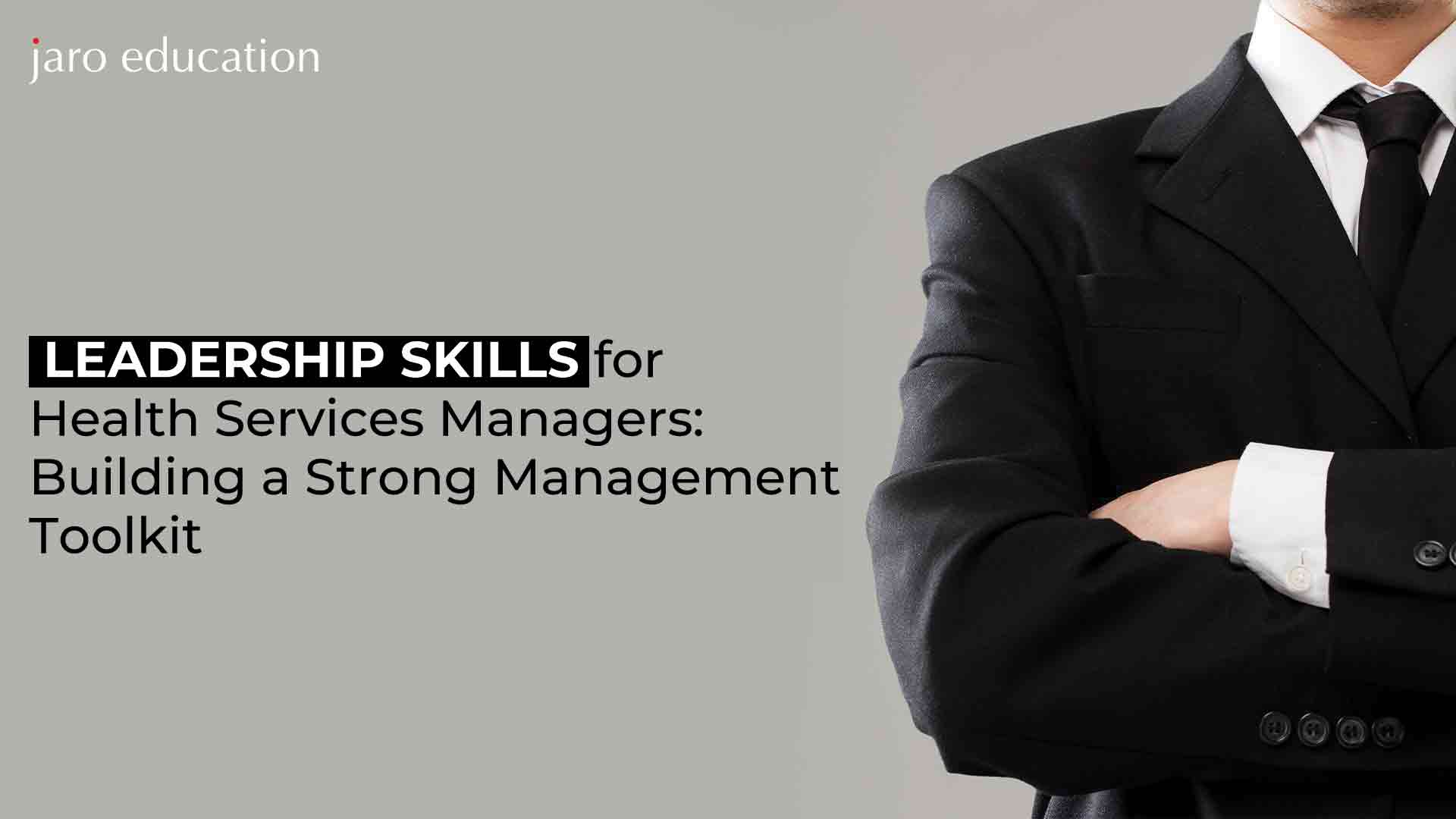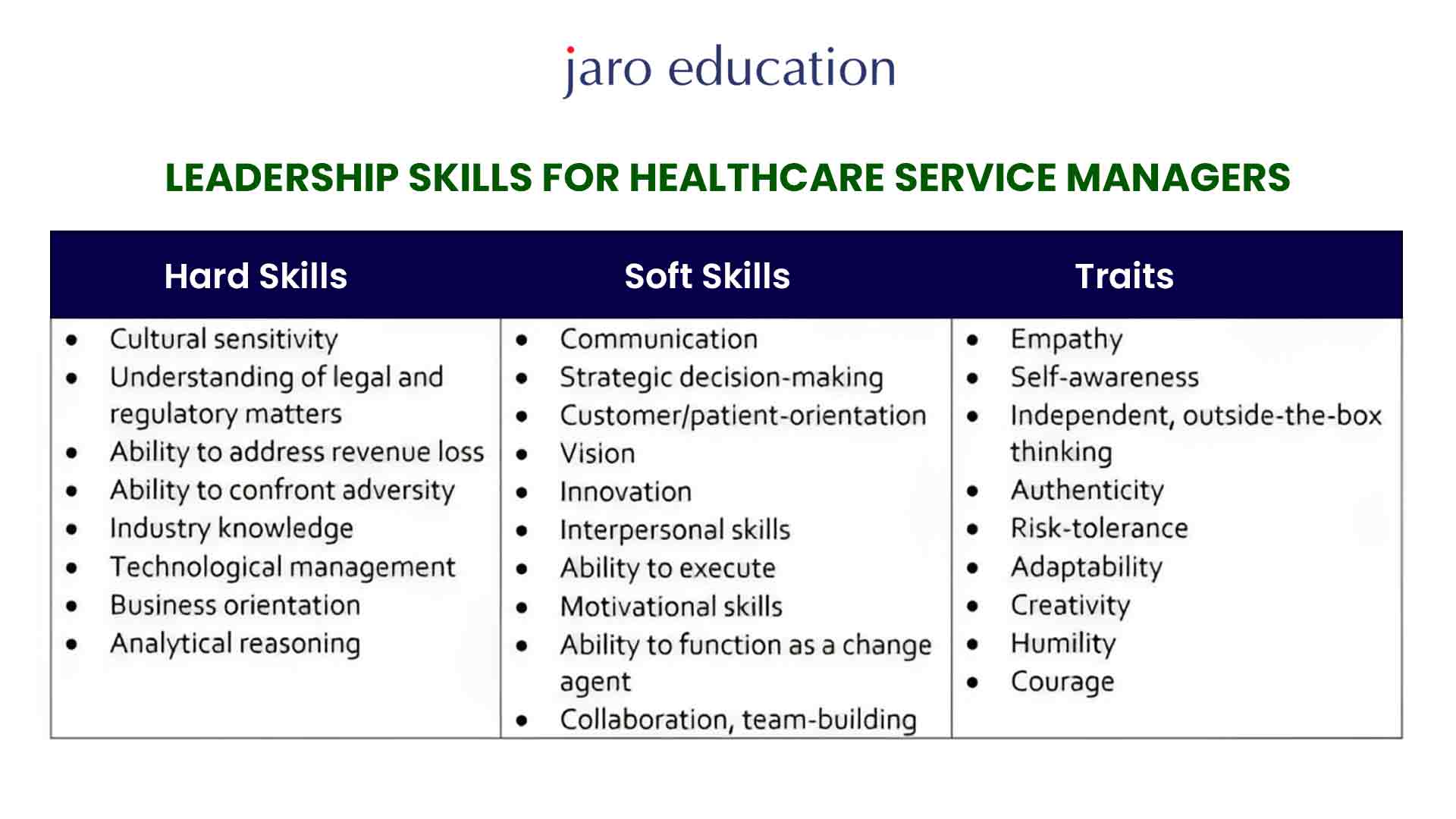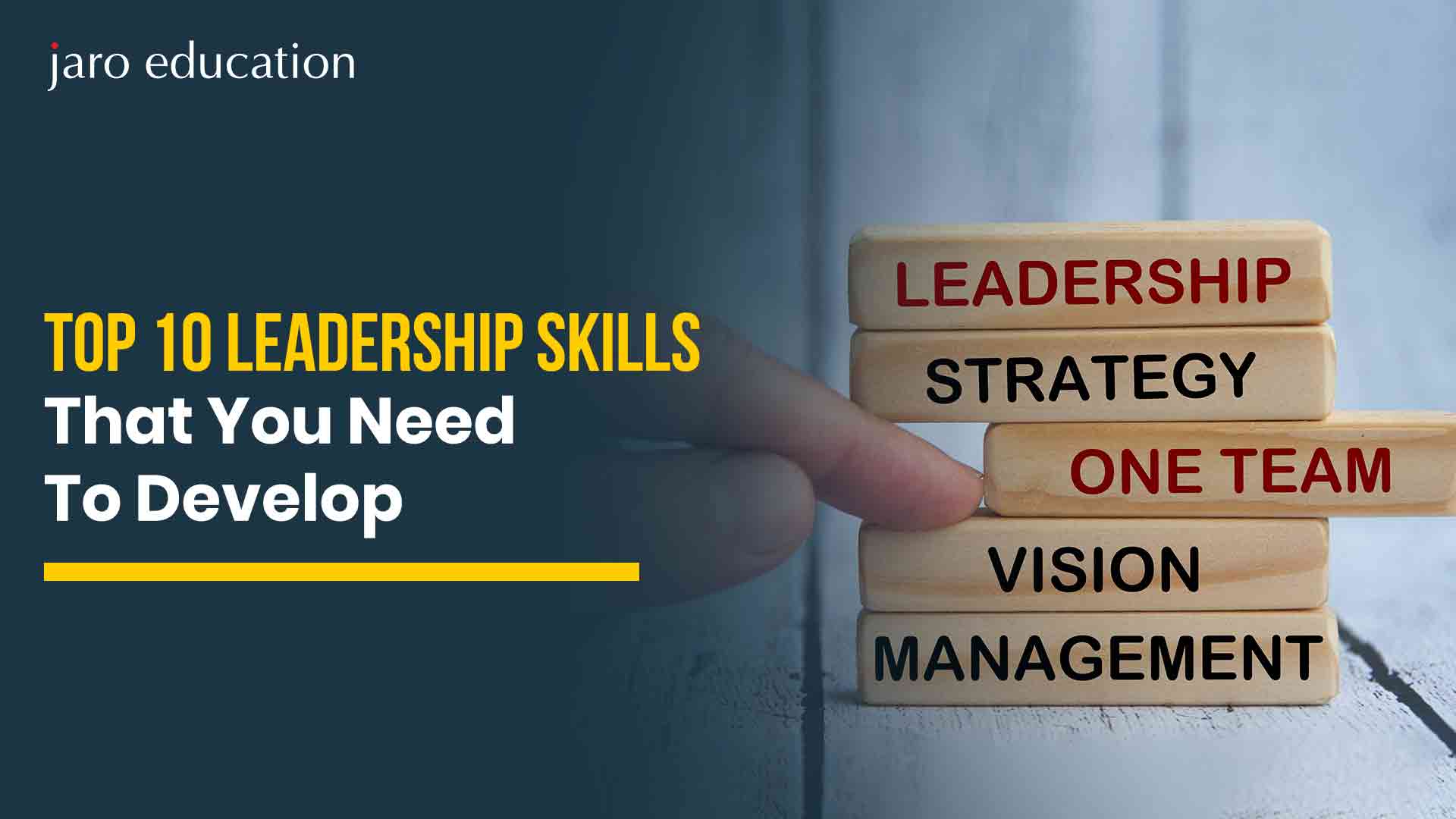Leadership Skills for Health Services Managers: Building a Strong Management Toolkit
Table of Contents

- jaro education
- 2, November 2023
- 11:00 am
In the dynamic world of healthcare, effective leadership is the most essential tool to navigate the complexities, foster innovation, and offer excellent care. Healthcare services managers must own a diverse toolkit of capabilities to lead their teams and businesses successfully. Moreover, it’s worth noting that healthcare leadership isn’t just about skill acquisition but also about comprehensive training and development.
One such academic opportunity for aspiring healthcare leaders is the Executive Programme in Health Services Management at IIM Ahmedabad. This esteemed program equips learners with the knowledge and insights needed to tackle the specific challenges of the healthcare industry. This programme is designed to help healthcare providers and managers adapt to the ever-changing healthcare environment and deliver care that revolves around the patient. Upon successful completion of the program, participants are given a Certificate of Achievement from IIM Ahmedabad, acknowledging their advanced competencies in healthcare management.
Important Leadership Skills For Health Services Managers
To serve the field of healthcare services in the best possible way, here are a few skills that effective health services managers must possess-
Trust and Integrity
Integrity is the key to powerful management in healthcare. In a field where ethical decisions often have lifestyle-altering results, leaders have to prioritise honesty and moral behaviour. Research has shown that integrity is sometimes disregarded in organisations, making it even more important to emphasise at all management levels. To be a successful leader, one must continuously display integrity and inspire the same in their team members.
Communication
Effective communication is integral in health services management. Healthcare managers have the ability to convey information clearly and sincerely, inspire their teams, and actively listen to foster trust and open dialogue. Using thought-provoking questions can amplify productive discussions and improve organisational culture. It is also important to note that effective communication skills are instrumental in executing business strategies and ensuring a successful healthcare delivery.
Delegation
Delegating important responsibilities may be a complex task. It’s not about unloading your workload; however, it is also about giving employees possibilities to examine and grow in their careers. Effective delegation promotes teamwork, presents autonomy, and builds acceptance and trust among direct reports. Leaders should master the art of delegation to foster professional improvement and performance in their group.

*harveycareers.com
Learning Agility
In dynamic healthcare surroundings, leaders must be agile and adapt to changes successfully. Critical thinking and innovative problem-solving are critical to generating innovative answers. Learning agility equips leaders to navigate the unpredictable terrain of healthcare and drive fruitful results.
Self-focus
Self focus is a trait evolved through self-reflection and recognising one’s strengths and weaknesses. Thus, it is important for managers in the healthcare sector to discover themselves truly to become effective leaders, as self-awareness complements decision-making, interpersonal relationships, and overall leadership skills.
Gratitude
A successful leader is aware of the importance of expressing gratitude. Acknowledging and appreciating the efforts of direct reports not only builds self-esteem but also reduces stress and tension, which in turn, creates an effective workplace culture and strengthens bonds among team members.
Empathy
Empathy is a powerful element of emotional intelligence and powerful management. Leaders should be willing to understand the various cultural and social backgrounds of their team members without any judgement. Harnessing employees’ various experiences fosters inclusivity and synergy in the team, letting them achieve their full potential.
Influence
Effective influencing capabilities can be a game-changer in healthcare leadership. Leaders should align their groups with project targets, gain buy-in from employees, and cultivate greater results. Motivating direct reports through logic, emotion, and synergy with teams maximises cooperation and complements innovative problem-fixing.
Courage
Courage is a trademark of effective leadership. Leaders must confront troubles instead of allowing confusion and incorrect information to spread. Courage empowers leaders to guide their teams on the right path. A workplace with a coaching culture of truth, courage, and elevated psychological safety promotes problem-solving and creativity.
Respect
Respect should be an everyday exercise for healthcare leaders. It promotes teamwork, resolves conflicts, and enhances overall efficiency. Building a culture of respect is essential to attract and retain high-performing individuals and leverage the contributions of the entire team.
Traits and Habits of Effective Healthcare Leaders
Effective healthcare leaders exhibit specific traits and habits that distinguish them in their roles. Let’s discover those attributes.
Take Mentorship Roles
Leaders often serve as mentors, especially to newcomers in the healthcare industry. Mentorship includes working closely with junior team members, modelling predicted behaviours, providing guidance, and offering encouragement. Effective mentorship requires understanding the mentee’s needs, assessing strengths and weaknesses, and mastering communication skills to facilitate development.
Seek Opportunities for Professional Development
Leaders in healthcare prioritise their professional development. They actively look for growth opportunities, such as training events, conferences, and continuing education, to stay up-to-date and enhance their skills. Joining professional companies additionally provides opportunities for improvement. By demonstrating dedication to their careers, leaders inspire their teams and enhance their overall effectiveness.
Prioritise Communication
Leaders excel in effective communication with their groups, patients, and colleagues across departments. Clear expression of thoughts and active listening are crucial elements. By knowing the needs, objectives, and attitudes of others, leaders build strong relationships and ensure alignment toward common goals.
Models Desired Behaviour
Leaders must exhibit the qualities that employees should also possess: moral principles, decency, equity, and prompt, efficient communication. This aids in setting an example through behaviour to create a high standard of constructive management, which fosters solid working relationships within the organisation.
Maintain a High Standard of Ethics
Ethical exercise is necessary in healthcare. Leaders make sure their organisation adheres to high ethical standards to protect patients’ well-being, their facility’s reputation, and their professional competence. Ethical leadership earns trust and appreciation from team members by means of demonstrating unwavering commitment to moral guidelines.
Use Active Listening
Listening actively is a vital communication skill that leaders employ to give their complete attention to speakers. It fosters effective conversation and strengthens interpersonal relationships. By limiting distractions, using verbal and nonverbal affirmations, and summarising speakers’ words to show comprehension, leaders demonstrate their engagement in conversations.
Know When to Delegate
Effective leaders understand their group members’ strengths and weaknesses and delegate tasks accordingly. Delegation lets leaders to focus on other responsibilities and demonstrates confidence in their team’s capabilities. It empowers team members to contribute their skills and feel valued.
Practise Effective Problem-Fixing
Leaders who leverage their problem-solving abilities are able to cope up with challenging situations in healthcare. Whether making strategic decisions for their corporations or devising solutions for patient care, problem-solving skills are vital to all the aspects.
Show Compassion for Others
Compassion is critical in healthcare management, especially while working with patients going through challenging health conditions. Effective leaders help their patients and team members emotionally by demonstrating empathy. Leading with empathy complements patient care and fosters meaningful relationships.
Demonstrate Self-Discipline
Self-discipline is crucial for maintaining focus and motivation in spite of distractions or challenges. Effective leaders exhibit self-discipline by staying on task, pursuing development possibilities, and mitigating burnout. It allows them to keep serving patients correctly and providing healthcare facilities efficiently.
Managing Risks in Healthcare Leadership
It is important to master the risk management toolkit since it is a critical element of a healthcare leader. It incorporates a proactive method of figuring out, assessing, and mitigating potential dangers that could impact healthcare corporations. This toolkit equips leaders with the ability to make informed decisions, anticipate demanding situations, and ensure the well-being and safety of their patients and employees. Effective risk management includes strategies such as data analysis, compliance tracking, and crisis preparedness. By integrating risk management into their management abilities, health services managers can navigate the complex healthcare landscape with self-confidence and resilience, fostering a culture of safety and excellence in healthcare delivery.
Mastering Leadership in Healthcare
To excel in management roles in the healthcare industry, specialists ought to continuously expand their skills in three key domains: technical, cognitive, and emotional competencies. These domains are interconnected and crucial for leadership success. So, let’s delve into these domains and get a better understanding of it:
Technical Competencies
Healthcare is a dynamic field that needs up-to-date technical knowledge. Leaders must stay current with industry developments and ideal practices to make informed decisions and lead their teams effectively.
Cognitive Competencies
In a generation of technological advancement, leaders should adapt to emerging technologies and include them in their techniques. Cognitive skills permit leaders to harness technology for improved patient care and organisational efficiency.
Emotional Competencies
Emotional abilities, inclusive of self-awareness and empathy, play an important role in leadership. They make contributions to professional performance and personal success. Leaders have to continuously examine and enhance their emotional capabilities to excel in their roles.
Thus, in a world where healthcare specialists are constantly challenged to provide the best possible care, mastering leadership skills isn’t simply an option; it is a need. Healthcare leaders must rise to the occasion, constantly refine their leadership toolkit, and inspire the ones around them to acquire greatness in the pursuit of greater healthcare for all. If you want to acquire these qualities of a leader in the healthcare industry and take your career one step ahead, get in touch with Jaro Education and be a part of the Executive Programme in Healthcare Services Management , offered by No.1 institute in India – IIM Ahmedabad. Master the skill of leadership effectively in your chosen career in healthcare services and management and see a brighter future in the healthcare sector with this program today!








